|

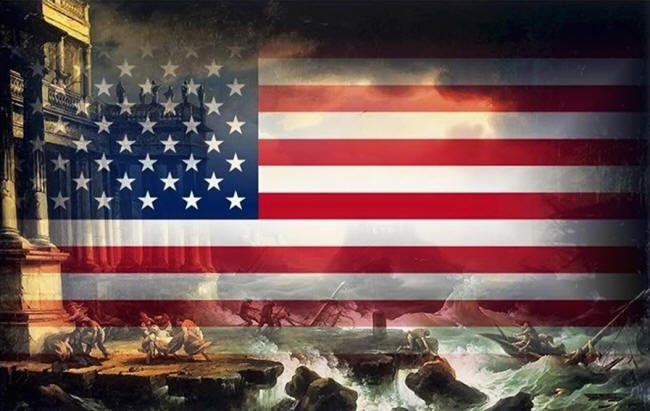
A
Financial Independence
in which
Europe faces not only
China and
Russia as authoritarian challengers
but also a
United States that for the time being
has traded
its role as a benign hegemon
for the
ugly face of "America first"...
Europe is Working on
Alternative to SWIFT for...
"Financial Independence" from the U.S.
by Tyler
Durden
August 27,
2018
from
ZeroHedge Website
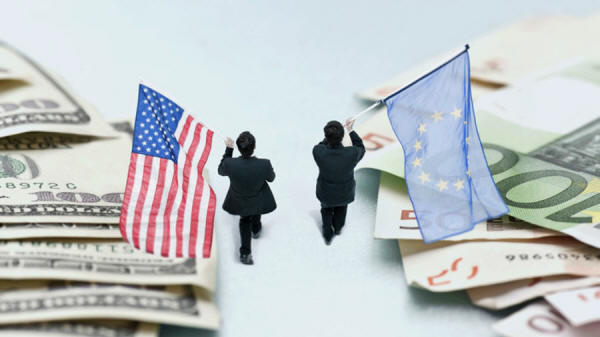
In the
aftermath of a
report that Germany was working on
a global payment system that is independent of the U.S. and
SWIFT on Monday (August 27, 2018),
Germany and France said they're working on financing solutions to
sidestep U.S. sanctions against countries such as Iran, including a
possible role for central banks,
Bloomberg reported.
"With Germany, we are
determined to work on an independent European or Franco-German
financing tool which would allow us to avoid being the
collateral victims of U.S. extra-territorial sanctions," French
Finance Minister Bruno Le Maire said Monday during a meeting
with press association AJEF.
"I want Europe to be
a sovereign continent not a vassal, and that means having
totally independent financing instruments that do not today
exist."
The discussions,
which also involve the U.K.,
are a signal
that European powers are trying
to get serious
about demonstrating a greater level
of independence
from the U.S. as
President Donald
Trump pursues his
"America First"
agenda...
After the U.S. reimposed sanctions on Iran, making funding to Iran
projects virtually impossible, European companies including
Daimler and Total halted activity or backtracked on
investment plans to avoid U.S. punishment, but France and Germany
and their European Union partners want business with the Islamic
Republic to continue.
Le Maire said using the
European Investment Bank, which has
exposure to the U.S., as a "financial channel" would be "very
complicated" and that the French and German governments are talking
to their respective central banks about their involvement.
"If we want to build
a truly independent instrument we must open up all the options,"
he said.
Separately, Germany's
Foreign Minister Heiko Maas again weighed in on the topic of
European financial independence on Monday, saying the EU is working
to protect economic ties with Iran and keep payment channels open.
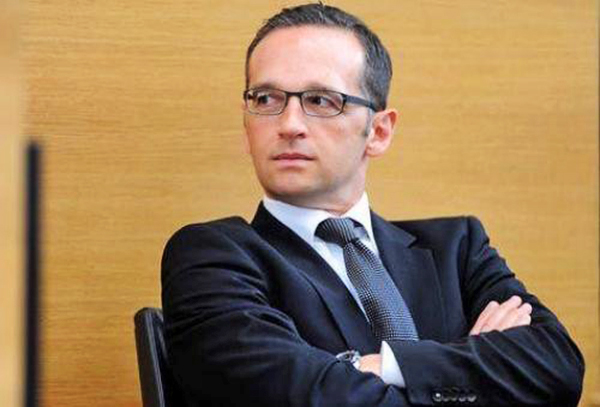
German foreign minister
Heiko Maas
Maas said Europe has started work on creating a system for money
transfers that will be autonomous from the currently prevailing
Society for Worldwide Interbank Financial Telecommunication (SWIFT).
"That won't be easy,
but we have already started to do that," Maas said at the annual
Ambassadors Conference in Berlin on Monday, as quoted by RIA
Novosti.
"We are studying
proposals for payment channels and systems, more independent
from SWIFT, and for creating European monetary fund."
Maas also announced plans
to reveal a new foreign policy strategy towards the U.S.
"We have to react and
strengthen Europe's autonomy and sovereignty in trade, economic
and finance policy," Maas said in a speech in Berlin.
"It's high time to
recalibrate the Transatlantic Partnership - rationally,
critically, and even self-critically," the FM added.
Maas echoed his comments
from last week when he called for European autonomy to be
strengthened by creating payment channels that are independent of
the United States, establishing a 'European Monetary Fund'.
Europe's desire to create its own system is connected to
Washington's recent withdrawal from the Iran nuclear deal,
and the re-imposition economic sanctions against the Islamic
Republic.
As Brussels stays
committed to the pact signed in 2015 between Tehran and the world
powers, the EU had to enforce the 'Blocking Statute' in order to
safeguard European businesses operating in Iran from U.S. sanctions
against the country.
However, the measure
failed to keep European majors like Total, Maersk,
Mercedes in Iran, as they cannot function independently of the
U.S.-dominated international banking system and international
financial markets.
SWIFT, which is short for the
Society for Worldwide Interbank Financial Telecommunication, is
the financial network that provides high-value cross-border
transfers for members across the world.
It is based in Belgium,
but its board includes executives from U.S. banks with U.S. federal
law allowing the administration to act against banks and regulators
across the globe.
It supports most
interbank messages, connecting over 11,000 financial institutions in
more than 200 countries and territories.
Ironically, it was Russia who took the first initiative, after its
Central Bank governor, Elvira Nabiullina,
said that the country had created a
national system for money transfers that could protect its banking
from a potential cut off from SWIFT transfer services.
The step was triggered by
the constant anti-Russia penalties introduced by Washington since
2014 for various reasons, including the reunification with Crimea,
alleged involvement in the military conflict in eastern Ukraine,
alleged U.S. election meddling, and the alleged poisoning of former
double-agent Sergei Skripal in the UK.
The result was also a
near complete liquidation of Russian holdings of U.S. Treasuries and
their conversion into gold and other non-U.S. foreign reserves.
Russia's Central Bank Governor
touts...
Moscow Alternative to SWIFT transfer system
...as Protection from US Sanctions
by Natasha
Turak
May 23, 2018
from
CNBC Website
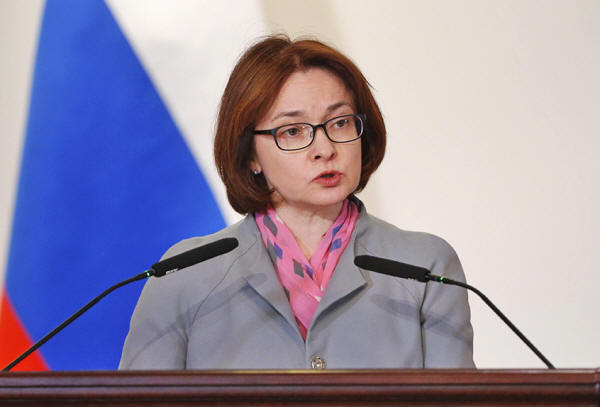
Russian Central Bank Governor Elvira Nabiullina
addresses an extended meeting
of the
Russian Finance Ministry's Board.
Dmitry Astakhov | TASS
Getty
Images
Elvira
Nabiullina said
Russia has
developed its own system
for financial
transfers.
But analysts have questioned
the viability of
Moscow's transfer system.
Russia has developed its own system for financial transfers that
would protect it from a potential shutout of the SWIFT global
transfer system in the event of harsher U.S. sanctions, its central
bank governor said Wednesday at the St. Petersburg International
Economic Forum.
But analysts have questioned the viability of Moscow's transfer
system.
"There are risks in
using the global financial networks, the global financial
system, of which Russia is a part," Russian central bank chief
Elvira Nabiullina told CNBC's Geoff Cutmore during the forum.
"Therefore, since
back in 2014, we have been developing our own systems, including
a payments system. Inside Russia we have created a system for
transferring financial data, which is similar to SWIFT."
SWIFT, which stands for
Society for Worldwide Interbank Financial Telecommunication, is a
global financial network that enables high-value cross-border
transfers among its members.
Most interbank messages are transferred using SWIFT, which links
more than 11,000 financial institutions in over 200 countries and
territories.
Based in Belgium, the
cooperative has in rare instances disconnected countries' banks from
its network as a tool of financial sanctions - notably on Iran in
2012, which was consequently denied access to billions of dollars in
revenue.
The
Donald Trump administration's
increasingly muscular foreign policy, which has rolled out new
financial sanctions against Iran as well as Russia, is raising
questions of risk for Moscow's banks should Washington step up its
financial penalties in the wake of rising tensions between the two
countries.
But Russia's Elvira Nabiullina was confident in her country's
risk-mitigation measures, saying that its own payments system,
"reduces the risks
for Russian players, for Russian businesses and for Russian
banks."
"This system is already operational and it allows, inside
Russia, to transfer financial data," she said, calling it an
"absolutely similar, competing system" that allows - at least
inside Russia - "to nullify such risks."
Financial analysts have their doubts.
Timothy Ash,
senior emerging markets sovereign strategist at Bluebay Asset
Management, described it as "not very credible." It might work for
the domestic market and some non-Western markets, he said, but was,
"not realistic for
dealing with Western partners."
Maximilian Hess,
senior political risk analyst at London-based AKE Group, echoed
similar skepticism.
"Russia has indeed
been working on its SWIFT alternative, but its potential for
mitigating the risks posed by a potential SWIFT ban is limited,"
he said.
That it would nullify
risks, he added,
"is a political
statement aimed at those in the government attuned to these
developments, not a serious statement that there would not be
major concerns were such a ban to come to pass."
However, Hess did not see
a SWIFT ban as imminently likely, although it will continue to be
threatened.
The issue, he explained, is that other countries are very unlikely
to use Russia's system, particularly as it would be fairly
straightforward for the U.S. government to threaten sanctions
against this too.
"Of course, it would
be far more effective to have an international system on which
everyone could rely, which would be distinguished by
predictability and an inviolability to the rules and access,"
Nabiullina said, perhaps in a subtle jab at Washington.
Russia has been under
older U.S. sanctions since its 2014 annexation of Ukraine's Crimean
peninsula, which played a major role in its subsequent recession.
"Russia has
encountered this and so, proceeding from this, we are taking
measures that reduce the risks for the Russian economy and the
Russian financial system," she said.
The U.S. Treasury in
April announced fresh
sanctions on seven Russian oligarchs and 12
companies they control, plus 17 top Russian officials in response to
what it called "destabilizing activities", these include,
Relations between the two
countries are said to be at their lowest level since the Cold War.
EU Looking to Sidestep U.S. Sanctions
...with
Payments System Plan
by William
Horobin and Birgit Jennen
August 27,
2018
from
Bloomberg Website
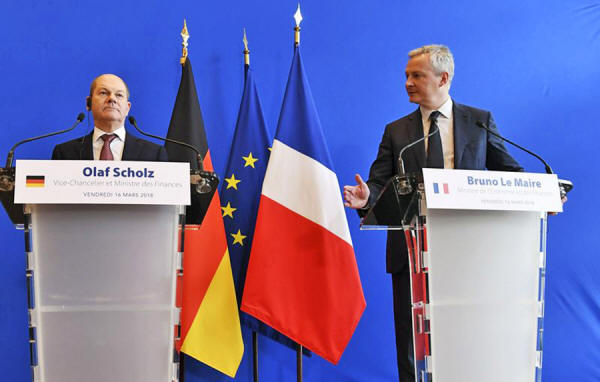
Bruno Le Maire and Olaf Scholz
Photographer: Alain Jocard/AFP via Getty Images
Europe
must avoid
being 'vassal
continent'.
French minister
Goal is to maintain
business ties
with nations
like Iran...
Germany and France said they're working on financing solutions to
sidestep U.S. sanctions against countries such as Iran, including a
possible role for central banks.
The discussions, which also involve the U.K., are a signal that
European powers are trying to get serious about demonstrating a
greater level of independence from the U.S. as President
Donald Trump
pursues his "America First" agenda.
"With Germany, we are
determined to work on an independent European or Franco-German
financing tool which would allow us to avoid being the
collateral victims of U.S. extra-territorial sanctions," French
Finance Minister Bruno Le Maire said Monday during a meeting
with press association AJEF.
"I want Europe to be
a sovereign continent not a vassal, and that means having
totally independent financing instruments that do not today
exist."
Trump reimposed the
sanctions after pulling the U.S. out of the Iran nuclear accord in
May, despite opposition from NATO allies and China and Russia.
European companies
including
Daimler AG and
Total SA have halted activity or
backtracked on investment plans to avoid U.S. punishment but France
and Germany and their European Union partners want business with the
Islamic Republic to continue.
The U.S. is targeting Iranian oil exports as it pushes demands for
the government in Tehran to stop supporting terrorism and halt its
ballistic-missile program.
President Hassan
Rouhani has said the U.S. needs to ease sanctions before he'd
agree to any talks.
German Foreign Minister Heiko Maas also weighed in Monday,
saying the EU is working to protect economic ties with Iran and keep
payment channels open. Maas reiterated a proposal to make
international payments systems like SWIFT more independent of the
U.S.
Bruno Le Maire said using the European Investment Bank, which
has exposure to the U.S., as a "financial channel" would be "very
complicated" and that the French and German governments are talking
to their respective central banks about their involvement.
"If we want to build
a truly independent instrument we must open up all the options,"
he said.
Maas said that while most
of the "very difficult questions on the details" of any payments
system are unresolved, at least the alternative of a nuclear
escalation in the Middle East has so far been avoided.
As well as the U.S.
sanctions against Iran, action taken against China, Russia and
Turkey will also damage European business, he added.
"We have to react and
strengthen Europe's autonomy and sovereignty in trade, economic
and finance policy," Maas said in a speech in Berlin.
Canadian Foreign Minister
Chrystia Freeland also spoke at the event and said that her
nation shares the goal of preserving a multilateral world order.
Le Maire is due to meet German counterpart Olaf Scholz in
Paris on Wednesday (August 29, 2018).
Trump's Trade War
...is Just Fine with Xi Jinping
by Michael
Schuman
September 8,
2018
from
Bloomberg Website
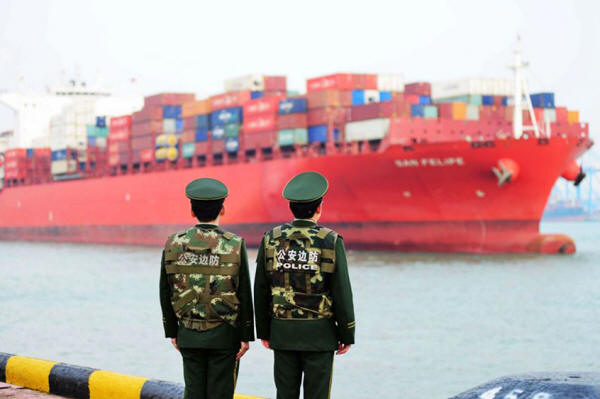
AFP/Getty Images
China's
far from desperate
to reach a
deal...
Anyone who expects China to concede defeat in its trade war with the
U.S. should read
about Biobase Group.
The Chinese manufacturer of laboratory equipment once struggled to
win orders even at home in an industry dominated by foreign
products.
But the company's
prospects have brightened as the trade war prompts customers to turn
to domestic alternatives.
"The local market was
heavily reliant on imports," Biobase's chairman was quoted as
saying. "Now, it's different. Opportunities beckon."
The story is from the
state-run
China Daily, so take it with a trailer-truck-sized grain
of salt.
But it makes an important
point:
The Chinese
government is happy when its citizens buy locally made instead
of American products.
Of the many
misperceptions driving Donald Trump's trade policy, this may
be the most dangerous:
China isn't desperate
to maintain its interdependent relationship with the U.S.
Rather, it's a national objective to become more economically
independent.
That's a quite different
China than the one in Trump's imagination.
To the White House, the
country is still so reliant on the U.S. for growth and jobs that its
leadership can be pounded into submission with tariffs. It's only a
question of when President Xi Jinping comes begging for
mercy.
In real life, Trump's tariffs are unlikely to inflict enough pain on
China
to compel Xi to make concessions. Its huge domestic market is
becoming more important to Chinese growth.
But beyond even that,
Beijing's entire economic strategy is designed to replace critical
foreign technology and products with homegrown alternatives it can
control. Simply, the Communist Party prefers Chinese to buy
Xiaomi phones and Geely cars, not iPhones and
Buicks.
That's exactly what the much-feared "Made
in China 2025" program is all about.
The plan is to develop
new, high-tech industries to compete with and eventually replace
foreign rivals, at home and abroad. In that sense, it's official
policy to limit overseas involvement in the economy.
The trade war, therefore, comes as a "blessing in disguise," as the
China Daily put it.
Trump's trade sanctions
have given Beijing another excuse to drag its feet on free-market
reforms, to support local companies and to harass and exclude
foreign business - all things Chinese leaders are inclined to do
anyway.
If anything, Trump's tactics have only reinforced the critical
importance of this quest for greater independence.
Take the
ZTE Corp. kerfuffle. After the
Chinese telecom giant violated U.S. law, Washington almost
forced
the company out of business by banning U.S. suppliers from selling
it crucial components. Eventually, a
settlement was reached.
The Chinese learned their lesson - just not the one Washington
intended.
Rather than scaring
Beijing into cooperating on trade, the incident reinforced how badly
the country needs its own technology.
"We [should] hold
innovative development tightly in our own hands," Xi
said amid
the ZTE troubles.
Even more, China's
economic program is aimed at developing export markets other than
the U.S.
The China Daily
was sure to mention how the Biobase chairman had a map in his office
marking countries participating in Xi's pet infrastructure-building
program, the
Belt and Road Initiative.
The goal of that plan is to entrench the country in new developing
economies in order to expand the role of Chinese business. In this
way, Beijing is striving to create its own economic bloc.
None of this means Beijing won't negotiate a trade deal with Trump.
Nor does Beijing's policy make sense from a purely economic
perspective.
Chinese growth prospects
would be better served by further integration and cooperation with
the U.S., to maintain access to American consumers and technology.
And since momentum in
China's economy already appears to be weakening, it can ill afford
the added headwinds created by
slowing world trade.
But Beijing sees its development plan as critical for national
security and the country's rise on the world stage. There's no place
in this great mission for,
-
Intel Corp.
-
Apple Inc.
-
General Motors
Co.
That means Xi may
be in less of a hurry to seek a trade deal than Trump
assumes, and will only conclude one that doesn't endanger his
broader economic agenda.
The bottom line is that China is content to go its own way on its
own terms. Without Trump and the U.S...
|







